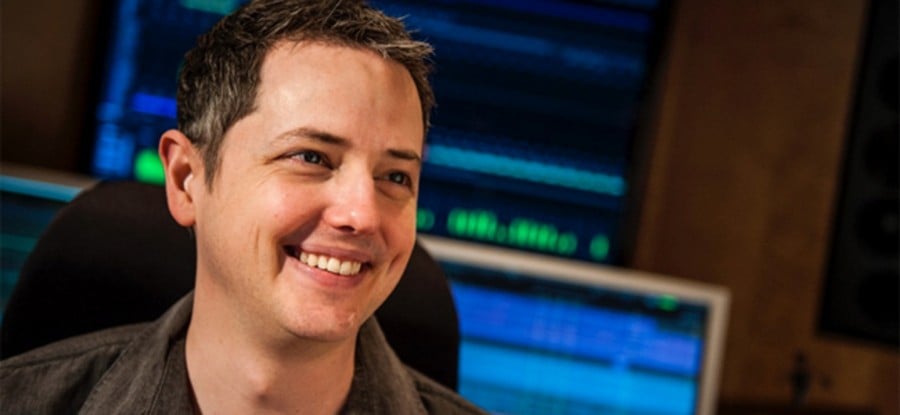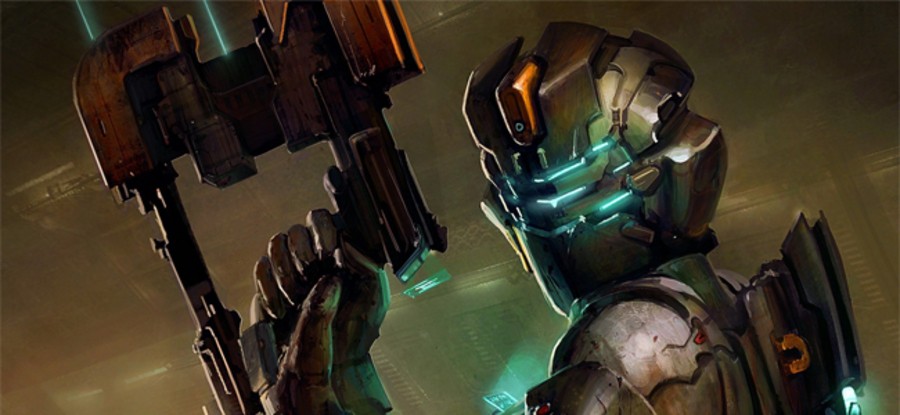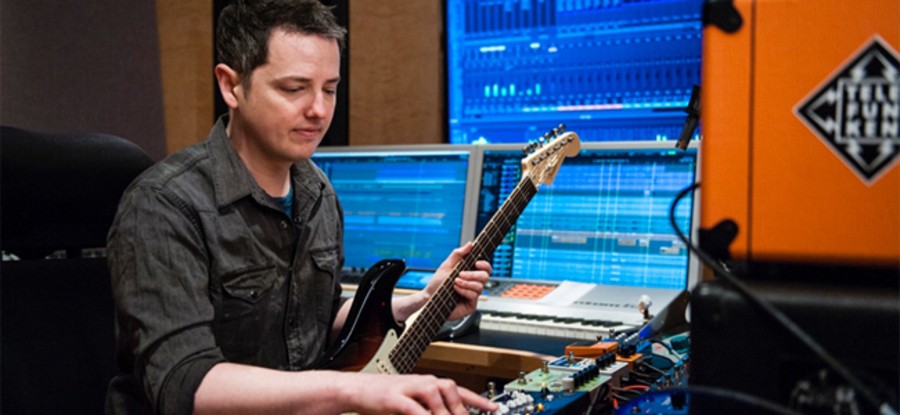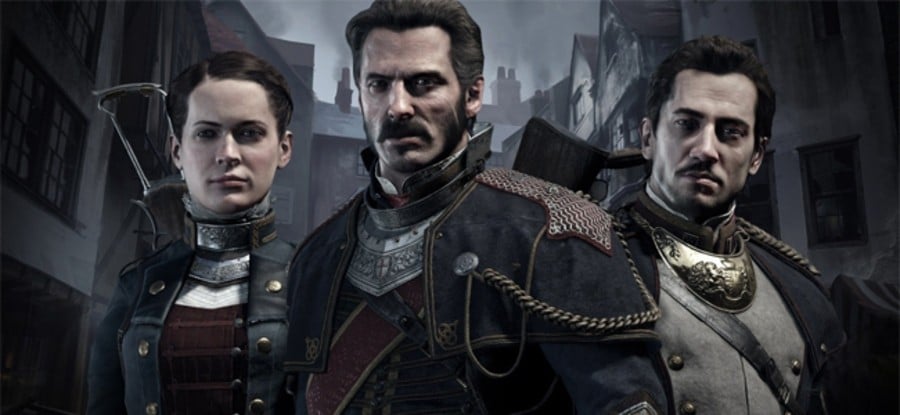
It's not often that we flag down video game composers for interviews, but we were recently presented with the opportunity at North Carolina's East Coast Game Conference to speak with Jason Graves, who's behind the soundtracks for the Dead Space franchise, Tomb Raider, Evolve, The Order: 1886, and more. To our surprise, we were able to chat for almost an hour about his interesting career and the deeper aspects of his music, and we've transcribed all of the highlights beneath.
Push Square: What led you to become a composer in the first place? What is your background in music?
Jason Graves: What led me to be a composer was growing up with parents that never told me I had to get a real job. That's really what it came down to! Even in high school when they had the career fair day, I remember the symphony; a cellist was there in the band room, and when I saw him, that's when I said, "That's what I want to do." And I think the cellist said something like, "If you can't imagine doing anything else besides music, then you should do it, but if you can imagine doing anything else, do that instead because you'll never make a living being a professional musician." But that wasn't much of a deterrent for me.
I was writing music even in high school. I wrote pieces for the band's percussion ensemble and the director would let them be performed in concert. He was a huge supporter of me, and we're still friends. Then I majored in music at Appalachian State University here in North Carolina, and the percussion professor taught music composition, steel band, and was the director of the electronic music ensemble, which is essentially all the things I do now that he got me started in.
Next, I decided I wanted to do film and TV music, so I went to the University of Southern California, which had a program out there for these kinds of music. I found out quickly it wasn't really for me, though. The work was okay, but just copying other film composers' styles wasn't for me in this business, so I moved back here to North Carolina and spent seven or eight years doing my own thing, working with a lot of local companies doing radio spots, election stuff, and commercials. I did get approached once for on-hold music for a phone sex line...I turned that down.
*Laughs* Yeah, we probably would have turned it down, too!
I could've used the money at the time, but I thought, "Do I want to look back in 10 years…no. I don't want to have that in the back of my head." But anyway, that's when – after those eight years here – I kind of fell into video games.
You seem to be implying that doing film and TV music is creatively limiting in a way, so that's why you branched out doing all these other minor things. How did that exactly lead into video games?
"I did get approached once for on-hold music for a phone sex line...I turned that down"
I've always loved orchestral film music that tells a story, and that's what I grew up with. Raiders of the Lost Ark, Star Wars…where I had the little 45s you could play the storybook in and it had the narration with the music playing behind it. That's the kind of music I loved, so that's what I wanted to write, but it wasn't appropriate for TV. What I did was too much, and even if my clients approved my work, my boss who I worked with said, "Why are you writing a melody and counter-melody? No one cares. Just do the beat, do the pad, and get paid." I don't really care about the "getting paid" part. I'm more concerned about doing music that's fun for me to do.
It just so happened that, in the game industry, it allows me to do all those things that I felt like I couldn't do before. Games allowed me to stretch out and try different things. One of the first games that came around for me was in 2002, when a developer approached me for King Arthur, which was based on the movie. It just so happened through my local networking that someone knew someone who worked for this game company in Australia and they needed music, and they needed it fast. I was ready to go, and did 40 minutes of music in 4 weeks.
I got to write everything I wanted, they loved it, and I got paid! So from then on, it was like, ok…games. I want to do more games. I want to work with these kinds of people: the creative, liberating, supportive people. I may be bad with games, I mean, if you get me on Dead Space or Tomb Raider, I'm the guy that walks into the room and I don't know which door I just came in. I don't have a good sense of direction in games, but I do love them.
What would you say makes you unique as a composer? Is there a particular instrument you love?
I think any composer is the sum of their life experience, and that's what makes each of them interesting and different. I'm a drummer. That's how I started, but I also learned all the mallets and timpani, was a classically trained percussionist at school, but I always saw that as my biggest deficit: being a drummer. Because all my college and composer friends? None of them are drummers, and they know a lot more about melody and harmony, and what I do is bang the drums real hard, play them in rhythm, and I'm good to go. But I look at it as a strength instead of a weakness, and that started with Dead Space back in 2008, mostly because I didn't feel like the game needed melodies or chords, so I fell back on rhythm, and I wasn't playing any drums. It was just writing from a rhythmic standpoint and using the orchestra as a drum where there's this odd meter, kind-of-crazy, off-kilter sort of thing.

We found it incredible how much the music felt a part of the overall sound design in Dead Space. The structured dissonance, screeching strings, blaring brass instruments, and overall eeriness of the orchestra really comes through and feels like a part of the whole environment. What was it like coming up with a soundtrack that's uncomfortable yet amazing? Is there any unconventional instrumentation and/or music theory you implemented?
I actually used a regular orchestra, but really, the idea was that EA knew they wanted scary music. There was about 20 minutes of music beforehand that was like Hollywood, action-blockbuster sci-fi music that I wasn't really feeling that much. Then they went away for about six months and essentially redesigned the whole game. The first project failed terribly. Not that it was a bad game, but it wasn't doing anything different or new, and the funny thing was is that they weren't approaching it as something scary. The design of the game didn't really change afterwards, but the tone did along with the game's music, which transformed the entire experience.
For me, it came down to the Necromorphs. Necro, meaning "death", and morph, "to change". I liked the idea of taking the orchestra and basically making a musical Necromorph. I thought of it as musical sound design, and there is music – unless you're in zero gravity – playing all the time, even at the lowest level it's so textural that it sounds like room tone. It was all these crazy experiments that I had no idea would work, and you can only do it with a live orchestra. We risked spending half of our recording budget on what may not work, and in many ways, it was appropriate because I was terrified!
The musicians were like kids in a candy store though. What they were playing was the opposite of everything they'd ever been taught. I started out saying, "I want you all to sound like five year olds who've only played for five weeks," and they start looking at the music and there's no notes. It's all blocks, instructions, and – for the ambient tones – "X's" that meant the 40 string players could play any note they wanted. It isn't non-musical, but textural while still being natural.
How did you feel about winning two BAFTA awards for the first Dead Space? Did the positive reception come as a shock?
I was shocked when it was nominated. I kind of swept it under the rug as a fun, little experimental project, and the game was a bit of a sleeper hit, too. I assumed the music would be disregarded since it was so visceral and in-your-face and not something people are going to listen to in their car on their way to work; very atonal, since there's literally no key or scale. I knew the audio was amazing though, because of the way they mixed the music and sound effects. A lot of that was audio director Don Veca, who was a big proponent of it all being about the build-up to the scary moment. He called it the "build-up to the boo".
Tomb Raider has got some awesome percussion, creepy sounds that echo the horror of the island Lara Craft is on, and some simple pieces that are uplifting and heroic. What was your favourite part about working on the reboot? Is there a particular song that defined the game for you?
"I liked the idea of taking the orchestra and basically making a musical Necromorph"
I think my favourite part was the piano theme because that's where the soundtrack started. If I'm working on a theme, I don't want to sit there for five hours and bang out 20 different versions. I kind of like to sit down for 20-30 minutes, do something, and leave to listen to it later with fresh ears. The theme that you hear was kind of the final version of maybe 30 minutes of figuring it out, and I was trying simple things like getting the melody to go upwards to mirror Lara's learning, journey, and progression on the island. John Williams always talked about the Star Wars theme and how it has big leaps in the notes, which I wanted to have somewhere.
My suggestion to the developer was to not have "wall-to-wall" music. Let's choose when the music needs to come in and have it come in for a reason. My whole idea was to start really small and quiet with the music. I was expecting the developer to want big, cool "look-at-this-epic-island-it's-going-to-be-such-a-good-adventure" music.

Maybe if it were Uncharted!
Exactly. I wanted to do the opposite because it was all about internalising the experience. She's alone on this island, fragile, vulnerable…and the developer totally went for it! There are small and single instruments playing at the beginning, and as you play through the game, discover more of the island, and see Lara gain confidence, more instruments are added over time. Especially at the end where you got big drums and French horns. I never thought they would let me follow through with that kind of arc. It was just wonderful to be able to go back with 20/20 hindsight of all the previous Tomb Raider games and build it from scratch the right way.
Evolve has a weird monster of a soundtrack. With so many small snippets of music for dozens of moments in the multiplayer matches, was this project a challenge for you? It has gritty, digitized music, which we don't believe you've done much for other games. What was that like to create?
The biggest challenge was trying to figure out how it was all going to sound once it was put together as a soundtrack because there were so many teeny, tiny pieces. In a way, it was like a groovier version of Dead Space. Not as scary, but very textural and hipper with cool beats. But it still has that mysterious, ambient kind of thing. I worked on it on and off over 18 months, and during that time I kept changing my idea of how I wanted to produce the music, but it ended up working. Some of the round starts in the music were some of the very first things I did, and some of the more synthesizer-y big tones and things were done near the end. If I had a choice, I would've liked to have gone back and maybe replace some of it because it sounded like it didn't have the same edge, but I mentioned it to Turtle Rock, and they liked that it had different kinds of shade to the music.
[Before our interview, Graves had given a presentation that was specifically about Evolve's music at the conference. He described it as a conglomeration of over 500 music clips called "stingers" and musical styles from his past work, which helped create the Monsters' music, which was designed to be primitive with chaotic, real instrumentation and plenty of drums, and the Hunters' music, which was more organized, digitized, and futuristic rock 'n' roll. There are even some sounds that that are mere noise filtered through a bunch of sound changers and guitar amps, such as a chair sliding across a floor, tapping on a desk, etc.]
How did Sony approach you for The Order: 1886? What was it like working on it with Ready at Dawn Studios, and what did you think of the alternate history, dark, Victorian premise and setting?
London's probably one of my favourite cities to go to, visit, and work in. And Ready at Dawn is like a big family; I immediately felt like a part of them, and as a matter of fact, they didn't even hire me. They asked if I could come out and meet with them, and they hired me in person and shook my hand. That's how personal and cool these guys are. I just hoped then that I could get some music in there that would live up to the visuals and story.
We've listened to the score and noticed how bare it is compared to most orchestral soundtracks. It's all string instruments for the most part, yes? Was this a stylistic choice to match the themes of the game?
"Anything I wrote was going to sound like The Order because it's such a stripped down combination of instruments"
A big part of it is the game. Just like with Dead Space – with the whole idea of a musical, orchestral Necromorph – it all comes back from the game, and they had concept art before there was gameplay of Dead Space. Same thing with The Order. They had concept art before they had any gameplay demonstrations, like an encounter with Galahad and a Lycan they showed me early on. But the overall idea was that Ready at Dawn and Sony pretty much gave me a creative blank check and said, "We want you to do whatever you think would work and something you could hear for five seconds, no matter where we're playing it on the soundtrack, and go, 'Oh, that's from The Order.'"
So, I automatically started thinking, well, what do I leave out that will clear space for some other things that aren't normally heard as much as they would be if all these other instruments were playing? They wanted it to have a special indie film kind of thing where it's a little quirky and different. So I thought, "What are the most overused, almost cliché things in Hollywood?" First would be violins. Everything's got violins on it. And second would be French horns, which I extended to brass. So we had twice as many violas and cellos, and then we added a lot of low winds. Most of the score is three-part harmonies because of this, especially with the themes. In a way, as challenging as this palette was, it was the best thing in the world because I painted myself into this corner and no matter how hard I tried, I had to use those instruments. By default, anything I wrote was going to sound like The Order because it's such a stripped down combination of instruments.
And how about that choir? 24 male voices, starting with baritone followed by bass and contrabass. These guys could sing lower than the lowest strings of the orchestra, and they sang so low that I couldn't do the music on the keyboard with the choir samples, so I wrote everything an octave higher and dropped the entire choir parts an octave lower at the sessions. I also said to Sony we had to include an a cappella somewhere, which we did with "The Knighthood". And now when you see it with the game, it's like the knights are singing.
I even got to record at Abbey Road in Studio 2 because we wanted a more intimate, punchier, and warmer soundtrack, which was possible with this smaller room and the close mics. Everyone sounded amazing in there, and since this was where The Beatles did all of their stuff, Pink Floyd did Dark Side of the Moon in there…the history of the room was just incredible, and composers like Howard Shore for The Hobbit, James Newton Howard for Maleficent, and John Powell for How To Train Your Dragon were scheduled to compose around my sessions. Talk about being in good company!

If there were any developer you could compose a soundtrack for, who would it be? Who are some of your favourite video game composers?
Naughty Dog. I love their stories and I feel like they don't try to push too hard. A lot of the bigger games, it's always, "Go, go, go, go go!" and everything's turned up to ten all the time, so what I love about anything from Uncharted to The Last of Us is that it's about the story, characters…kind of like Pixar. You can tell the plot of any of the Pixar movies, and if you reword it enough, it would just really be a touching story but, oh, by the way, it's a cartoon. Same thing with these games, since Naughty Dog seems like they choose the path less travelled by experimenting and trying different things.
I'm good friends with Garry Schyman. He and I share an affinity for modern orchestral music, so I love all the stuff he did for the BioShock series and Shadow of Mordor. Lately, I've been playing Hohokum with my kids and love the soundtrack, and that's like beats and down-tempo techno music. I really loved Austin Wintory's score for Journey because it didn't sound like what people consider to be "video game music" and The Banner Saga, which has all these eclectic instruments with a wind ensemble. He's a super great guy, and I consider all of these people friends. Jesper Kyd's another one. I've been a fan of his for a long time, and I could keep going on.
Rise of the Tomb Raider should eventually find its way to the PS4, so are you involved with the music? Can you tell Push Square readers what they should look forward to hearing from you next?
This is the blessing and curse of the game industry because everything is so amazingly secretive. I don't think there's anything that I'm allowed to talk about! All the games I'm allowed to talk about just came out, and I've got two more pretty big ones that are coming out this year, which have been finished for a while. What is that line? "I can neither confirm nor deny my involvement," which is what I'll say about Tomb Raider. There are some things I'm working on that have 2017 release dates! I've learned to just not say anything to anybody about anything until someone goes, "Hey, you can talk about that now!" or until the game actually comes out. The secrecy's totally worth it, though.
That concludes our interview with video game composer Jason Graves. What do you think of the music he has scored for the games mentioned here? What are your favourite songs by him, and what do you think he should compose next? Have we convinced you to give his work a closer listen? Write us a symphony in the comments section below.
Comments 7
Brilliant interview, @DrJoeystein. I always find these kinds of discussions interesting, and Jason had some great stories and insight to share. Thanks very much for putting it together.
This is one heck of an interview @DrJoeystein, absolutely brilliant read.
Great interview; I enjoyed reading about an aspect of games that isn't discussed as often. It really makes me think about just how many creative voices are involved in making a single game and what a fantastic artform it is.
The Order:1887 confirmed for 2017! Lol jk That was a great interview.
This is a great interview. I'm actually kind of jealous!
Hey everyone! Forgot to say thanks for the compliments. In all honesty, Jason Graves was such an easy, nice guy to speak with that my nervousness of approaching such a talented composer quickly went away as we got absorbed into our conversation. I interviewed him back in April, so it took a long time transcribing the interview with school to deal with up until May. So, I'm glad I could finally get this up for you all to enjoy!
"I was expecting the developer to want big, cool "look-at-this-epic-island-it's-going-to-be-such-a-good-adventure" music."
"Maybe if it were Uncharted!"
"Exactly. I wanted to do the opposite because it was all about internalising the experience."
I don't appreciate that stab, because Uncharted's soundtracks aren't that bombastic all the time. Sounds like Graves doesn't really know the Uncharted-soundtrack if he simply agrees. Not cool from a musician/composer.
Then again, I wouldn't think so, because plenty of the 'Tomb Raider'-reboot has been copied "back" tight from the Uncharted-games (because clearly it was doing things better, while the Tomb Raider franchise was in a rut during the time the first THREE Uncharted-games were already out and basically being "Tomb Raider in that current generation done right").
Not that I don't like the 'Tomb Raider' game and the soundtrack, I've actually really enjoyed it and also looked up this interview because I wanted to know more. - But don't write off the Uncharted-soundtracks for just being wall-to-wall and in-your-face adventure-music, because it has plenty of calmer and more sensitive moments. And again, the soundtrack of 'Tomb Raider' actually has things that are very reminiscent of the Uncharted-soundtrack and Greg Edmonson's style. - In fact, they would probably make a great team of composers.
Show Comments
Leave A Comment
Hold on there, you need to login to post a comment...